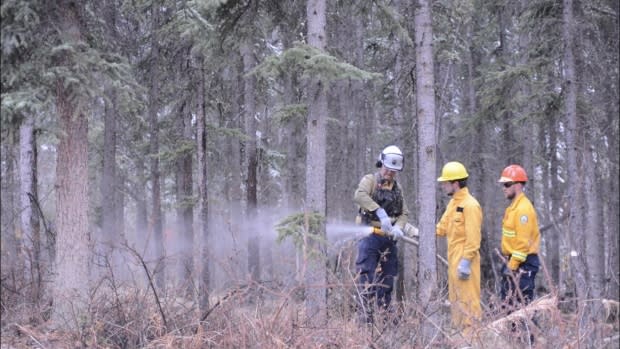It's lit: Whitehorse to host fire-focused Operation Nanook-Tatigiit
With a busy wildfire season forecast for Yukon, government emergency officials will gather in Whitehorse and Teslin for this year's edition of Operation Nanook-Tatigiit, which begins Monday.
The exercise will include a scenario that simulates a major wildfire near the Whitehorse subdivisions of Cowley Creek and Mary Lake. The scenario will also include a mock evacuation, complete with a reception centre for evacuees and a mobile clinic set up at the Canada Games Centre June 5.
Mike Dine, chief of the Whitehorse Fire Department, said one of the exercises will help firefighters look out for wood piles or trees too close to homes, which put them at greater risk from what are called interface fires: wildfires that come into contact with urban areas.
"We will be sending crews out to do what we call structural triage," Dine told reporters at a media briefing on Thursday. "They decide how and which properties they can defend, because they won't be able to defend everything."
Dine also said approximately 100 firefighters will be working on a controlled burn June 4 near the Cadet camp off the Alaska Highway south of downtown Whitehorse. Residents may notice smoke in the area, he said.
Whitehorse Mayor Dan Curtis lashed out at critics who, he said, complain that the city is not ready for a major wildfire of the kind that is currently threatening High Level, Alta.
"There's a lot of people would like you to believe that nothing has happened, we're not ready, we're not prepared. That's the farthest thing from the truth," Curtis said at Thursday's briefing.
"I don't think it's appropriate to say we're the tip of the torch and we're going to burn. We live in the middle of a forest."

Operation Nanook-Tatigiit typically takes place in August or September, but Community Services Minister John Streicker said the Yukon government asked to move it to late spring in order to give crews a chance to practice for the coming wildfire season.
"We asked them if they could move it forward for us [because] it would make it closer to real and engage more of our team," Streicker said.
The annual operation includes law enforcement and the Canadian Forces. Nearly 150 personnel will head north for this year's event.

